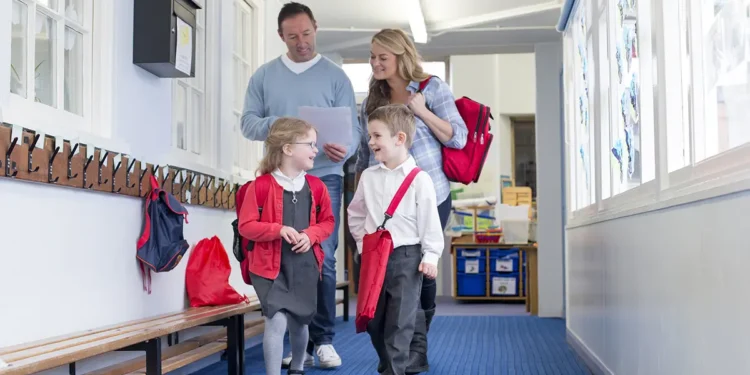Starting school is a significant milestone in a child’s life, and as a parent, it’s essential to communicate with your child’s school effectively to ensure a smooth transition and ongoing success. Open and proactive communication lays the foundation for a collaborative relationship between parents and educators, fostering an environment where children can thrive academically and emotionally.
Why Effective Communication Matters
Effective communication between parents and schools is crucial for several reasons:
- Early Intervention: Timely discussions can identify and address academic or behavioural issues before they escalate.
- Shared Expectations: Aligning on goals and expectations ensures consistency between home and school environments.
- Supportive Environment: A collaborative approach creates a supportive network for the child, enhancing their confidence and motivation.
Be Proactive in Your Engagement
A 2022 study by Parentkind revealed that 85% of parents desire active involvement in their child’s education, yet only 57% feel listened to at the school level. To bridge this gap:
- Attend School Events: Participate in parent-teacher meetings, workshops, and school functions to stay informed and connected.
- Volunteer: Offer your time for school activities or committees, demonstrating your commitment to the school’s community.
- Initiate Communication: Don’t wait for issues to arise; reach out to teachers with questions or updates about your child’s progress.
Prepare for Meetings and Conversations
When engaging with school staff:
- Gather Information: Bring relevant documents such as report cards, assignments, or notes from previous meetings.
- Set Objectives: Know what you want to discuss and what outcomes you’re aiming for.
- Take Notes: Document discussions and agreed-upon actions for future reference.
Maintain a Respectful and Open Dialogue
Approach every interaction with respect and openness:
- Listen Actively: Give full attention to the teacher’s insights and perspectives.
- Stay Calm: Even when discussing concerns, maintain a composed demeanour to facilitate constructive conversation.
- Express Appreciation: Acknowledge the efforts of educators in supporting your child’s development.
Foster Curiosity About the School Experience
Engage your child in conversations about their school day:
- Ask Specific Questions: Enquire about subjects they enjoy, challenges they face, and their interactions with peers and teachers.
- Observe Behaviour: Notice any changes in mood or attitude that may indicate issues at school.
- Encourage Openness: Create a safe space for your child to share their thoughts and feelings about school.

Communicate Clearly and Concisely
When addressing concerns or sharing information:
- Be Direct: Clearly state your observations or questions without unnecessary detail.
- Use “I” Statements: Express your perspective without assigning blame (e.g., “I noticed that…”).
- Follow Up in Writing: After meetings, send a summary email to confirm understandings and next steps.
Understand Your Rights and Responsibilities
Familiarise yourself with educational policies and your rights as a parent:
- Review School Policies: Understand the school’s procedures for addressing concerns, special education services, and disciplinary actions.
- Know Legal Rights: Be aware of laws and regulations that protect your child’s educational interests.
- Advocate Effectively: Use this knowledge to support your child’s needs within the educational system.
Build Positive Relationships with School Staff
Developing strong connections with educators can enhance communication:
- Introduce Yourself: Make an effort to meet teachers and staff early in the school year.
- Stay Involved: Regularly check in on your child’s progress and participate in school activities.
- Show Gratitude: Express thanks for the dedication and hard work of school personnel.
Utilise Technology for Communication
Leverage available tools to stay connected:
- School Portals: Use online systems to monitor grades, attendance, and assignments.
- Email and Messaging Apps: Communicate with teachers through approved digital channels for quick updates and questions.
- Social Media: Follow school social media accounts for news and announcements.
Encourage a Collaborative Approach
Work together with educators to support your child’s learning:
- Set Shared Goals: Align on academic and behavioural objectives for your child.
- Develop Action Plans: Create strategies together to address challenges and track progress.
- Celebrate Successes: Acknowledge and reward achievements to motivate continued effort.
Conclusion
In summary, the ability to communicate with your child’s school is a vital skill that empowers you to be an active participant in your child’s education. By fostering open, respectful, and proactive communication, you build a partnership with educators that supports your child’s academic journey and overall well-being. Remember, your involvement makes a significant difference in your child’s success.
Q&A: How to Communicate with Your Child’s School When They’re Struggling
Q1: Why is it important to communicate with my child’s school proactively?
Proactive communication establishes a collaborative relationship between parents and educators, ensuring that any concerns are addressed promptly. By initiating dialogue early, you can work together to support your child’s academic and emotional needs. Regular communication helps in identifying potential issues before they escalate, fostering a supportive environment for your child.
Q2: What are the best ways to initiate communication with teachers?
Start by introducing yourself at the beginning of the school year, expressing your interest in being involved in your child’s education. Utilise multiple communication channels such as emails, school portals, or scheduled meetings. Being approachable and showing genuine interest encourages teachers to share insights about your child’s progress.
Q3: How can I prepare for meetings with school staff?
- Gather Relevant Information: Bring along your child’s academic records, previous communications, and any observations you’ve made at home.
- Set Clear Objectives: Know what you want to discuss and what outcomes you’re aiming for.
- Take Notes: Document discussions and agreed-upon actions for future reference.
Being organised ensures that meetings are focused and productive.
Q4: What should I do if my child is facing specific challenges at school?
Engage in open conversations with your child to understand their perspective. Share these insights with teachers to provide a comprehensive view of the situation. Collaborate with educators to develop strategies that address your child’s unique needs, ensuring consistent support both at home and school.
Q5: How can I ensure effective follow-up after meetings or discussions?
- Summarise Key Points: After meetings, send a follow-up email summarising the discussion and any agreed-upon actions.
- Monitor Progress: Keep track of the implemented strategies and their effectiveness.
- Maintain Open Communication: Regularly check in with teachers to discuss your child’s progress and make necessary adjustments.
Consistent follow-up reinforces the collaborative effort to support your child’s development.







